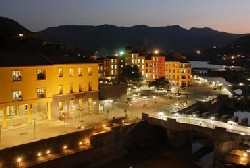The controversial Lavasa hill city project near Pune of Hindustan Construction Corporation's subsidiary has made for a torrent of news, with the Union environment ministry (MoEF) saying it was illegal and would be allowed to proceed only on hefty fines. Ajit Gulabchand, chairman and managing director, speaks about the issues.
When and how did the Lavasa idea germinate? Lavasa is a project in response to the Maharashtra government wanting to build a hill station city near Pune.
Lavasa is a project in response to the Maharashtra government wanting to build a hill station city near Pune.
Lavasa actually looks at the needs of India's urbanisation. We need to consider our urbanisation needs and this project couldn't have come at a better time to create a kind of replicable model of a new city.
Lavasa is attempting to create an idea that such a city can be built, and rapidly, and not only restore or preserve the ecology but enhance it as well.
The idea is to create a social and an economic, as well as an environmentally enhanced entity which is sustainable.
What do you say on the recent MoEF order, which has given conditional clearance?
It is harsh and we are concerned. We are disappointed and strongly contest allusions to environmental violations.
Lavasa has introduced several benchmarks in environmental protection and mitigation and we are proud of it.
It is further disheartening that the Ministry has made a casual usage of the term 'unauthorised' for a project that has been 10 years in the making and has seen an investment of over Rs 4,000 crore (Rs 40 billion), clearances from state government and more recent clearances from the central government.
We have maintained that the MoEF order is more on jurisdiction than on environment issues. In fact, the order says the Maharashtra state government did not have authority for giving the 2001 and 2004 clearances and has also challenged the state government's hill stations policy of 1996, saying it should be reviewed.
This clearly indicates the key issue is over jurisdiction between the state and central government.
MoEF does not have objective and measurable norms on environment protection and restoration.
Therefore, instead of restricting themselves to environmental issues, MoEF has resorted to questioning state government jurisdiction, the Special Planning Authority, Maharashtra Krishna Valley Development Corporation land transfer, land purchase, Lavasa Master Plan approval by the Collector, hill station policy, regional development plan, MRTP Act.
These have nothing to do with environmental issues which the court had directed them to study.
What aspects of the environment committee's report do you find unacceptable, which is the basis of this order?
No weightage or consideration has been given to the huge body of data submitted by us on environment protection and enhancement initiatives, which included various test reports from MoEF-approved labs and the visual evidence shown to them during their site visit.
The entire focus of the technical committee report is on jurisdiction and application of notifications, rather than the environment enhancement and protection work done.
Does this mean the order is to spite few people in the political circles who are known to be close to you and Lavasa, especially Sharad Pawar's family? It is also being said that it was your close association with this family which ensured swift passing of approvals.
HCC is a publicly listed company with a very strong legacy and is an institution which has several firsts to its credit. Lavasa Corporation has filed for its Initial Public Offer and therefore all company-related information has been given to the Securities and Exchange Board of India.
Let's first understand that Sadanand Sule, son-in-law of Sharad Pawar, had a stake in this project six years ago and we've been working on this project for 10 years.
Sadanand Sule is not just Sharad Pawar's son-in-law; he's also Balchandra Sule's son, who was the former managing director of Mahindra & Mahindra and on the HCC board for a long time.
Sadanand is also the nephew of B G Deshmukh, former Cabinet Secretary of India. Sharad Pawar, after visiting England during the 80s, saw the Lake District there and felt, we too have four of five lakes created for irrigation and water, why not build something on similar lines. So, the idea was floated.
But it was never concretised till the BJP-Shiv Sena government came to power in Maharashtra - it is they who created the Hill Station policy under which Lavasa was conceptualised. The project got no special permissions and it has taken its time.
How do you sum up this experience of dealing with the ministry?
To some extent, this experience has been a bit Kafkaesque. We would like to work with the MoEF to create replicable models for other townships, as we have maintained that the MoEF has no objective and measurable standards.
We will be meeting with the ministry, to try and work out the future direction for the project, especially since they have asked for several project details, including investments.
There are several figures floating around on investments already made in Lavasa, losses incurred by you since November 25 (the first stop-work order).
Till date, Lavasa Corporation has invested approximately Rs 3,000 crore (Rs 30 billion) in the project and another Rs 1,000 crore (Rs 10 billion) have been invested through our various SPVs.
Over the next 10 years, Lavasa will attract and will have an investment of Rs 40,000 crore (Rs 400 billion).
Since we stopped development and construction work, we are losing at the rate of Rs 2 crore (Rs 20 million) per day. Apart from the monetary losses, HCC's market capitalisation has seen huge erosion.
The group's goodwill of over 100 years has been severely dented, which cannot be measured.












 © 2025
© 2025